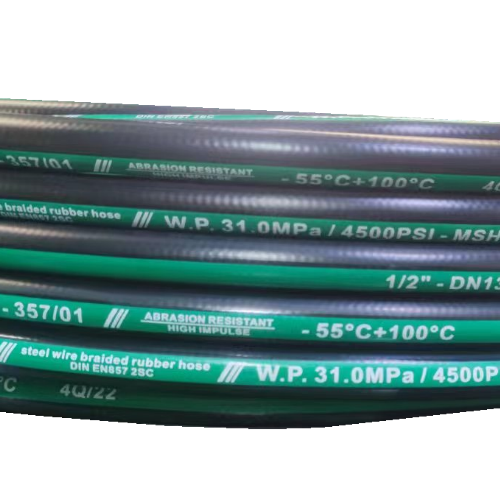335345435
Th11 . 12, 2024 15:50 Back to list
soft rubber hose
The Versatility and Significance of Soft Rubber Hoses
Soft rubber hoses are vital components in numerous industries and applications. Known for their flexibility, resilience, and durability, these hoses serve crucial functions across sectors such as automotive, manufacturing, agriculture, and more. In this article, we will explore the characteristics, applications, benefits, and manufacturing processes related to soft rubber hoses.
Characteristics of Soft Rubber Hoses
Soft rubber hoses are typically made from a blend of natural and synthetic rubber, including materials like neoprene, EPDM (ethylene propylene diene monomer), and silicone. These materials confer several desirable properties, such as
1. Flexibility Soft rubber hoses can bend and twist without kinking or breaking, making them ideal for dynamic applications where movement is expected. 2. Resilience Rubber's natural ability to return to its original shape after deformation helps hoses endure repeated stress and strain.
3. Resistance to Weathering Many rubber formulations provide exceptional resistance to UV rays, ozone, and extreme temperatures, enabling hoses to function effectively in various environmental conditions.
4. Chemical Resistance Depending on the specific rubber compound used, these hoses can resist a range of chemicals, making them suitable for conveying liquids in harsh environments.
Applications of Soft Rubber Hoses
The versatility of soft rubber hoses allows them to be used across a multitude of industries
1. Automotive In vehicles, soft rubber hoses are used for coolant systems, fuel lines, air intake systems, and brake fluid transportation. Their flexibility and durability ensure reliable performance in critical systems.
2. Agriculture Farmers utilize soft rubber hoses for irrigation, chemical application, and transferring water. Their resistance to abrasion and UV exposure allows them to withstand outdoor conditions.
3. Manufacturing Many factories employ soft rubber hoses for pneumatic tools, conveyors, and liquid transfer within production lines. Their ability to withstand pressure and dynamic movement makes them essential in manufacturing processes.
4. Medical In healthcare settings, soft rubber hoses are utilized in various equipment, such as oxygen delivery systems. Their non-reactive nature ensures patient safety.
5. Construction Soft rubber hoses are found in concrete pumping, dust extraction systems, and water delivery for construction projects. Their strength and flexibility make them ideal for heavy-duty applications.
Advantages of Soft Rubber Hoses
soft rubber hose

The use of soft rubber hoses offers several benefits over alternatives such as metal or rigid plastic pipes
1. Ease of Installation Their lightweight and flexible design make soft rubber hoses easier to handle and install, reducing labor costs and installation time.
2. Reduced Noise and Vibration Rubber's inherent dampening properties help minimize noise and vibration, making systems that utilize these hoses quieter and more efficient.
3. Cost-Effectiveness Soft rubber hoses are generally more affordable than their rigid counterparts. Their long service life and low maintenance requirements contribute to overall cost savings.
4. Customization Hoses can be manufactured to custom specifications, allowing businesses to meet unique needs in terms of diameter, length, and specific rubber formulations.
Manufacturing Process
The manufacturing of soft rubber hoses involves several steps
1. Compounding Raw materials, including rubber, fillers, and additives, are blended to create a specific formulation tailored for desired properties.
2. Extrusion The rubber compound is fed into an extruder, where it is shaped into a hose-like form through a die.
3. Curing The extruded hose undergoes a curing process (vulcanization), where heat and pressure cause the rubber to crosslink, enhancing its strength and elasticity.
4. Testing Finished hoses are subjected to rigorous quality control tests to ensure they meet industry standards for pressure, flexibility, and chemical resistance.
5. Distribution Once approved, the hoses are packaged and shipped to various industries, ready for installation.
Conclusion
Soft rubber hoses are an integral part of modern industry, enabling flexibility, efficiency, and safety in various applications. With their remarkable characteristics and numerous advantages, these hoses play a pivotal role in ensuring the smooth operation of machinery and processes across sectors. As technology evolves, so too will the innovations in rubber hose manufacturing, enhancing their performance and expanding their applications even further. The future of soft rubber hoses is bright, solidifying their position as indispensable components in our industrial landscape.
-
SAE 100 R17 Black Smooth Cover Hydraulic Hose
NewsMar.07,2025
-
SAE 100 R17 Black Smooth Cover Hydraulic Hose
NewsMar.07,2025
-
SAE 100 R17 Black Smooth Cover Hydraulic Hose
NewsMar.07,2025
-
SAE 100 R17 Black Smooth Cover Hydraulic Hose
NewsMar.07,2025
-
SAE 100 R17 Black Smooth Cover Hydraulic Hose
NewsMar.07,2025
-
steel wire braided hydraulic hose
NewsMar.07,2025



